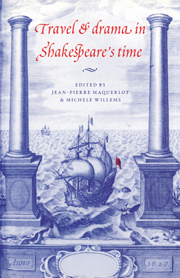Book contents
- Frontmatter
- Contents
- List of contributors
- 1 Introduction
- 2 Foreign relations in Jacobean England: the Sherley brothers and the ‘voyage of Persia’
- 3 ‘The naked and the dead’: Elizabethan perceptions of Ireland
- 4 The Elizabethans in Italy
- 5 Tragic form and the voyagers
- 6 Nationality and language in Thomas Kyd's The Spanish Tragedy
- 7 Marlowe's Argonauts
- 8 Pirates and ‘turning Turk’ in Renaissance drama
- 9 The wrong end of the telescope
- 10 ‘Travelling hopefully’: the dramatic form of journeys in English Renaissance drama
- 11 ‘Seeing things’: Amazons and cannibals
- 12 Industrious Ariel and idle Caliban
- 13 The New World in The Tempest
- 14 ‘What's past is prologue’: metatheatrical memory and transculturation in The Tempest
- 15 Lope de Vega and Shakespeare
- Index
15 - Lope de Vega and Shakespeare
Published online by Cambridge University Press: 22 September 2009
- Frontmatter
- Contents
- List of contributors
- 1 Introduction
- 2 Foreign relations in Jacobean England: the Sherley brothers and the ‘voyage of Persia’
- 3 ‘The naked and the dead’: Elizabethan perceptions of Ireland
- 4 The Elizabethans in Italy
- 5 Tragic form and the voyagers
- 6 Nationality and language in Thomas Kyd's The Spanish Tragedy
- 7 Marlowe's Argonauts
- 8 Pirates and ‘turning Turk’ in Renaissance drama
- 9 The wrong end of the telescope
- 10 ‘Travelling hopefully’: the dramatic form of journeys in English Renaissance drama
- 11 ‘Seeing things’: Amazons and cannibals
- 12 Industrious Ariel and idle Caliban
- 13 The New World in The Tempest
- 14 ‘What's past is prologue’: metatheatrical memory and transculturation in The Tempest
- 15 Lope de Vega and Shakespeare
- Index
Summary
In a recent article I pointed out that two of the contributors of verses on Shakespeare to the First Folio were distinguished Hispanists: James Mabbe, the translator of Celestina and Leonard Digges who was responsible for the first comparison of Lope with Shakespeare. He lived near Stratford, where his stepfather was to become the overseer of Shakespeare's will. I suggested further that Shakespeare would have appreciated the sustained irony of Lope's verse address to the Madrid Academy, The New Art of Writing Comedies, as he too had been badgered by critics who regarded popular plays with disdain. Lope had pretended to lament that his plays were not modelled on those of Plautus and Terence. In only six of his 483 plays did he not sin against art:
Yet I defend what I have written. Though,
If I had striven for a stricter style,
The plays might have been better, yet I know
My faithful patrons would have run a mile.
Their principles, alas, are so debased,
My very lapses satisfy their taste.
There was no British Academy in Shakespeare's day; but he and his fellow-dramatists were haunted by the ghost of Sir Philip Sidney whose justifiable strictures on the drama of his time were written before the advent of the University Wits. He ridiculed the plays written for the professional stage because they flouted the Unities; and the one modern play he could bring himself to praise was Gorboduc, written in the Senecan style by two aristocratic amateurs.
- Type
- Chapter
- Information
- Travel and Drama in Shakespeare's Time , pp. 239 - 254Publisher: Cambridge University PressPrint publication year: 1996



